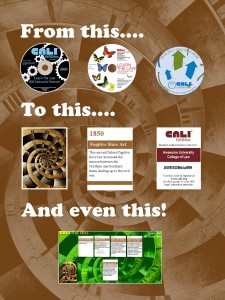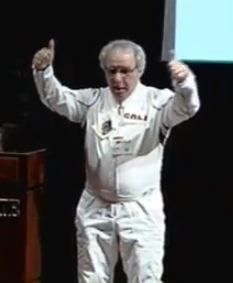 CALI is known for many things…innovation in legal education, a commitment to providing quality and value to our membership and creating tools that increase access to justice, to name a few. Among certain segments of our membership, we are also known for something else:
CALI is known for many things…innovation in legal education, a commitment to providing quality and value to our membership and creating tools that increase access to justice, to name a few. Among certain segments of our membership, we are also known for something else:
THE CALI DVDs!!!!!
Yes, like the swallows returning to Capistrano, every year CALI has sent out boxes and boxes of DVDs to our member schools. We sent enough for schools to hand out one DVD to each of their new and returning law students. That’s over 140,000 DVDs every year!
We didn’t do it to keep the postal service in business. Before ubiquitous high-speed internet service, the DVDs allowed students to run CALI lessons away from school computing labs. It was also a physical object – and, we hoped, an aesthetically pleasing one – that schools could hand to students to introduce them to CALI and all that it offers.
This worked fairly well, but recent changes in personal technology have made the DVDs less practicable. Tablets, Smart phones, Macs, netbooks… none of these come with the capability to play DVDs or CD-Roms. Our internal statistics show that these make up over half of the visitors to our website. So why continue something that half of the students couldn’t use?
Our solution was to create Time Trial.
Time Trial is a card game that tests a player’s knowledge of legally relevant dates – court cases, U.S. Supreme Court justice tenures, U.S. Constitutional amendments and federal public laws. The rules are simple: players take turns reading the cards to each other and putting them into chronological order. We even made an online version for solo play. The content of the cards was written by law librarian Tom Gaylord of IIT Chicago-Kent College of Law.
We think we struck a good balance with this game. It’s easy enough in format to pick up and use immediately and in subject to allow even 1Ls to get some correct answers initially. At the same time, it’s enough of a challenge to make it intriguing and plays upon the competitive nature of all law students. (And maybe some law professors and librarians too!)
This summer every law school was sent enough ten-card packs to give one to each of their students, both incoming 1Ls as well as returning students. Additionally, each school was sent three box sets that contain all 200 cards. If you would like to put them on reserve in your school’s law library, the OCLC/Worldcat record number is #852411155.
(Pssssst…by the way, did you know that all of the our CALI Lessons are cataloged too?)
We hope that the card packs will be distributed in the same time and manner that the DVDs were. Hopefully the unique format of a card game will intrigue students enough to not immediately throw it away like they might with a brochure or flyer or ignore it like they would a mug or other common swag. The CALI Authorization code for your school is also visible on the back of the card packs. (As a reminder, students will need this code to register for CALI.) The URL for the online version of the game appears on the back of each card. Students are introduced to CALI on that website and again encouraged to register. Registered students will be able to save their scores.
In a few weeks, you will be receiving posters at your school advertising Time Trial, CALI Lessons and our Faculty Services. In the meantime, here is a PDF of an 8×11 flyer for Time Trial that you can print off and either include in your orientation materials or post.
CALI is a non-profit consortium of law schools. We rely upon you, our membership, to help us introduce CALI to your students. The number one complaint we get from students is that they wish that they had heard about CALI earlier. We currently have over 900 interactive lessons on over 35 legal subjects for students to use for students to use as study aids or for faculty to use as an assessment tool. We also provide free and open casebooks and supplements through our eLangdell Press, website creation, podcasting and course management tools through Classcaster and form building software for law school clinics and legal aid organizations with A2J Author. In short, CALI has many, many things to offer! We’re not just a tool provider. We are your partner in legal education and technology.
We are always available and willing to do whatever we can to help you promote use of CALI with your faculty and students. Please don’t hesitate to contact me, Sarah Glassmeyer at sarah AT cali.org to discuss some options. And if you otherwise have problems, questions, complaints, suggestions or ideas about CALI, please contact our executive director, John Mayer at jmayer AT cali.org. He would love to hear from you!
 The Federal Rules of Procedure govern how litigation in federal courts occurs. They are also a very common supplement assigned to law students, who then spend upwards of $50.00 to purchase them. So it is with great pleasure that we can announce that the current editions of the Federal Rules of Civil Procedure, Criminal Procedure, Evidence, Bankruptcy Procedure and Appellate Procedure (with forms) are now available – for free! – in ebook format from eLangdell Press.
The Federal Rules of Procedure govern how litigation in federal courts occurs. They are also a very common supplement assigned to law students, who then spend upwards of $50.00 to purchase them. So it is with great pleasure that we can announce that the current editions of the Federal Rules of Civil Procedure, Criminal Procedure, Evidence, Bankruptcy Procedure and Appellate Procedure (with forms) are now available – for free! – in ebook format from eLangdell Press.







